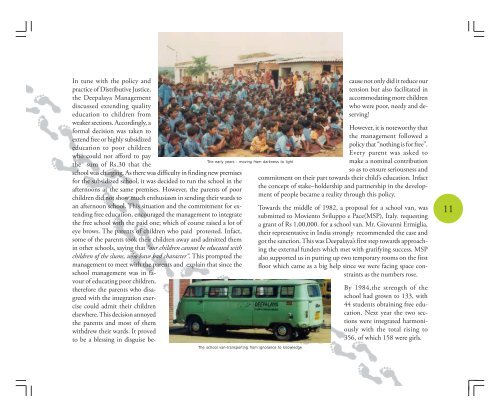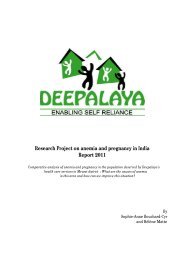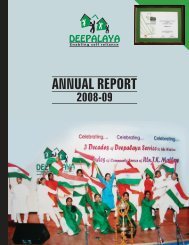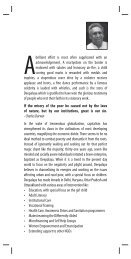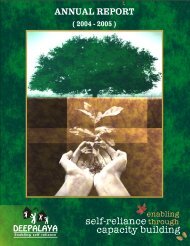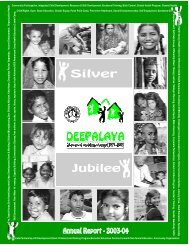Create successful ePaper yourself
Turn your PDF publications into a flip-book with our unique Google optimized e-Paper software.
In tune with the policy and<br />
practice of Distributive Justice,<br />
the <strong>Deepalaya</strong> Management<br />
discussed extending quality<br />
education to children from<br />
weaker sections. Accordingly, a<br />
formal decision was taken to<br />
extend free or highly subsidized<br />
education to poor children<br />
who could not afford to pay<br />
the sum of Rs.30 that the<br />
school was charging. As there was difficulty in finding new premises<br />
for the subsidized school, it was decided to run the school in the<br />
afternoons at the same premises. However, the parents of poor<br />
children did not show much enthusiasm in sending their wards to<br />
an afternoon school. This situation and the commitment for extending<br />
free education, encouraged the management to integrate<br />
the free school with the paid one; which of course raised a lot of<br />
eye brows. The parents of children who paid protested. Infact,<br />
some of the parents took their children away and admitted them<br />
in other schools, saying that “our children cannot be educated with<br />
children of the slums, who have bad character”. This prompted the<br />
management to meet with the parents and explain that since the<br />
school management was in favour<br />
of educating poor children,<br />
therefore the parents who disagreed<br />
with the integration exercise<br />
could admit their children<br />
elsewhere. This decision annoyed<br />
the parents and most of them<br />
withdrew their wards. It proved<br />
to be a blessing in disguise be-<br />
The early years - moving from darkness to light<br />
The school van-transporting from ignorance to knowledge<br />
cause not only did it reduce our<br />
tension but also facilitated in<br />
accommodating more children<br />
who were poor, needy and deserving!<br />
However, it is noteworthy that<br />
the management followed a<br />
policy that “nothing is for free”.<br />
Every parent was asked to<br />
make a nominal contribution<br />
so as to ensure seriousness and<br />
commitment on their part towards their child’s education. Infact<br />
the concept of stake–holdership and partnership in the development<br />
of people became a reality through this policy.<br />
Towards the middle of 1982, a proposal for a school van, was<br />
submitted to Moviento Sviluppo e Pace(MSP), Italy. requesting<br />
a grant of Rs 1,00,000. for a school van. Mr. Giovanni Ermiglia,<br />
their representative in India strongly recommended the case and<br />
got the sanction. This was <strong>Deepalaya</strong>’s first step towards approaching<br />
the external funders which met with gratifying success. MSP<br />
also supported us in putting up two temporary rooms on the first<br />
floor which came as a big help since we were facing space constraints<br />
as the numbers rose.<br />
By 1984,the strength of the<br />
school had grown to 133, with<br />
44 students obtaining free education.<br />
Next year the two sections<br />
were integrated harmoniously<br />
with the total rising to<br />
356, of which 158 were girls.<br />
11


